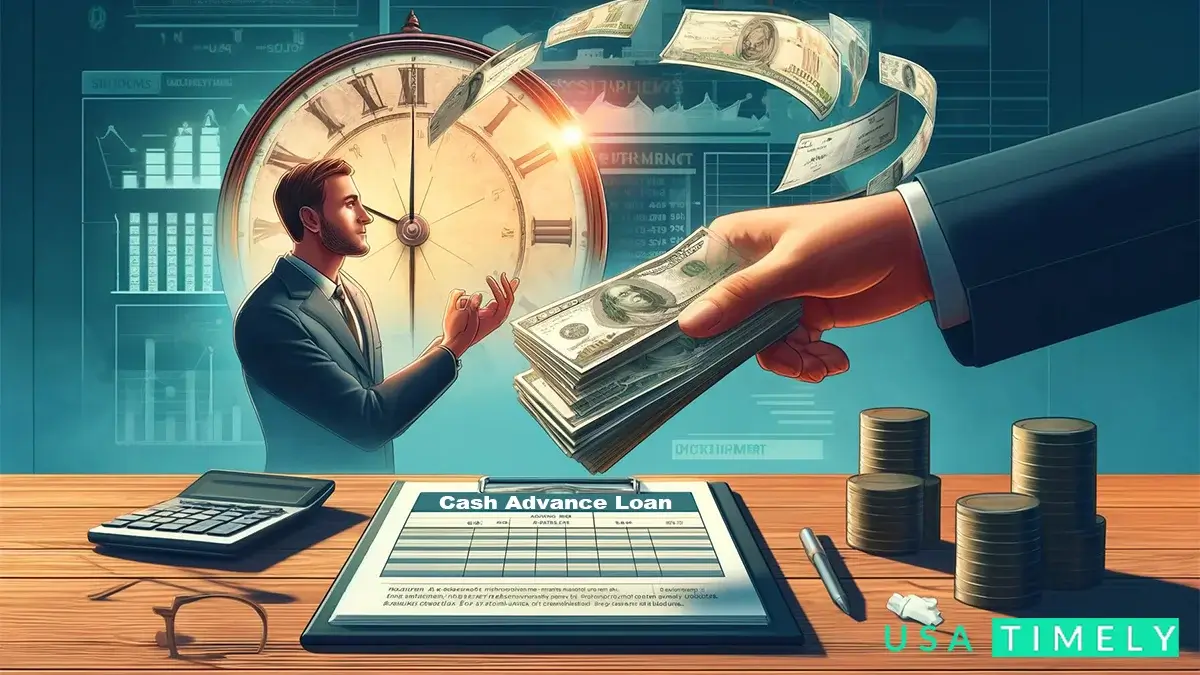Finance
Merchant Cash Advance Loans Pros & Cons

In business, keeping the cash flowing smooth is important. Every business hits rough patches when sales slow down and funds get tight. During these times, seeking external funding becomes necessary. One option that many people consider is a merchant cash advance, among various others for small business financing.
What is a Cash Advance Loan?
A cash advance loan is when you borrow money upfront against what you’ll earn in the future. Essentially, the lender gives you cash before you actually get paid. It’s like trading in some of your future income for money in your pocket right now. Unlike regular loans, it’s not just about borrowing money, it’s more like selling a part of what you’ll earn later.

With personal cash advance loans, you borrow money against your upcoming paycheck. When payday rolls around, the lender takes back what you borrowed, plus some extra fees. Sometimes, they’ll have you write a check for the total amount, including fees and cash it once you’ve got the money.
These loans often come with steep fees, which can pile up fast and leave you stuck with a big debt. That’s why some people see cash advance loans as kind of predatory. But for those who don’t have a credit card, they can be a lifeline for getting some cash when you’re in a pinch.
“There’s another kind of cash advance called a merchant cash advance loan, which is specifically for businesses that need quick cash. Various benefits are offered for small business owners who choose to use merchant cash advances, particularly those provided by Blursoft.”
What is a Merchant Cash Advance?
A merchant cash advance is a way to get some quick cash if you’re having trouble getting a loan from a bank or somewhere else. It’s a short-term solution where you borrow money against what you’ll earn from credit card sales in the future. Usually, you pay back what you borrowed, plus some extra fees, within six to twelve months.
To get a merchant cash advance, your business needs to make credit card sales every day and you have to show that you’ve been making these sales for at least four months. Most companies offering these advances want to see that you’re making between $2,500 and $5,000 in credit card sales each month, depending on how much you want to borrow. This helps them make sure you’ll be able to pay back what you owe.
How does Merchant Cash Advance Work?
Merchant cash advance companies usually work with businesses that mainly take debit and credit card payments, like retail stores, service shops, and restaurants. But even if your business doesn’t have high card sales, there are still ways to get an advance:
In a traditional merchant cash advance, you’d get a lump sum upfront. Then, a fixed percentage of your daily or weekly sales are automatically taken out to pay back the advance, along with fees. This is called a “holdback.” The more sales you make, the faster you pay back the advance. But remember, it’s not cool to tell your customers to pay in cash just to avoid paying back the advance faster: that could land you in legal trouble.
Alternatively, with an ACH merchant cash advance, you also get a lump sum upfront. But instead of a percentage of your sales, a fixed amount is taken directly from your business checking account each day or week until the advance, plus fees, is paid off. Unlike the traditional method, the amount taken doesn’t change, no matter how much you’re selling. These advances can be paid off faster, unless your business runs low on cash, making it hard to make those payments.
Fees for a merchant cash advance can add up, usually ranging from 1.2% to 1.5% of the advance amount. So, if you borrow $40,000 with a 1.5% fee, you’ll end up paying back $60,000 in total – $40,000 for the advance and $20,000 in fees.
It’s important to know that merchant cash advances are way pricier than regular loans. Plus, they can get you stuck in a cycle of debt where you have to take out another advance just to pay off the first one, leading to even more fees.
Pros & Cons of Merchant Cash Advance
Merchant cash advances offer some benefits and drawbacks when compared to other types of small business loans:
| Merchant Cash Advance Pros | Merchant Cash Advance Cons |
| Almost immediate access to cash | Extremely high APR, potentially as high as 200 percent |
| Easy repayment | High payment frequency that can hinder cash flow |
| Low credit score acceptable | No impact on business credit score or report |
| No restrictions on loan use | Binding in ways that other loans aren’t |
| No need to put up collateral | Unavailable to small businesses that don’t accept credit card payments |
Alternatives for a Merchant Cash Advance
Looking for alternatives to a merchant cash advance? There are plenty of financing options out there that can provide the working capital your small business needs. USA Timely have listed a few alternatives to consider:
Business Line of Credit

- Similar to a credit card, a business line of credit (LOC) gives you access to a set amount of funds that you can borrow against whenever you need it.
- You can borrow and repay as many times as you need, up to the maximum limit of your credit line.
- Approval is often quick, and repayment terms typically range from three to 12 months.
Short-Term Loan

- Offered by private lenders, short-term loans are unsecured business loans with lower interest rates and more transparency compared to merchant cash advances.
- These loans usually provide up to $500,000 in financing, with repayment terms ranging from three months to three years.
- Approval is fast, usually within a week.
“Tip: There are several lending options available to your firm. The finest small business loans provide a simple application procedure, clear pricing information and flexible payback alternatives.”
Payment Processor Financing

- If you use credit card processing services like Square or PayPal, you may qualify for financing through them.
- These loans, typically under $100,000, can be applied for directly through your online account.
- They often come with lower factor rates (around 1.1% to 1.16%) compared to merchant cash advances.
Each of these alternatives offers its own set of benefits and considerations, so it’s essential to explore which option aligns best with your business’s needs and financial situation.
“Lenders and investors want proof that they won’t lose money when they request for business funding. You should bring thorough financial statements to your pitch meeting in order to provide this. If they’re still unsure about your company’s financial situation, though, it could be because you haven’t put together an audited financial statement.”
Merchant Cash Advance FAQs
Is a merchant cash advance legal?
Yes, merchant cash advances are legal because they’re not technically loans. Instead, they involve selling a portion of your future income. The companies offering these advances aren’t subject to the same regulations as traditional lenders since the advance is usually repaid within a year.
Why use a merchant cash advance?
Despite the high fees associated with merchant cash advances, there are some reasons why businesses consider them:
- Quick access to funds: You can usually get the money within 24 to 48 hours.
- No collateral required: Your assets aren’t at risk if your business fails to fully repay the advance.
- Automatic repayments: Payments are automatically deducted, so you won’t miss any due dates.
- Flexible payments: During slow sales months, you’ll pay less back to the advance provider.
- Minimal paperwork: Applying for a merchant cash advance involves minimal paperwork compared to traditional loans.
Do merchant cash advances hurt your credit score?
While merchant cash advance providers may check your credit as part of the application process, it typically won’t impact your business credit score significantly. However, some providers may conduct a hard credit check, which could potentially lower your score. It’s essential to inquire about the type of credit check they perform before applying.
How do you apply for a merchant cash advance?
Applying for a merchant cash advance is relatively straightforward, whether online or in person. You’ll typically need to provide:
- Contact information for your business
- Your personal information, including your Social Security number
- The company’s tax ID number
- Several months of credit card processing history and bank statements
- Proof of citizenship
- A blank check or your checking account number and routing number
USA Timely explains that the application process is quick and you can usually get approved within hours or days. Once approved, you’ll sign a contract outlining the advance amount, repayment terms and other details, the funds will be transferred to your bank account.













